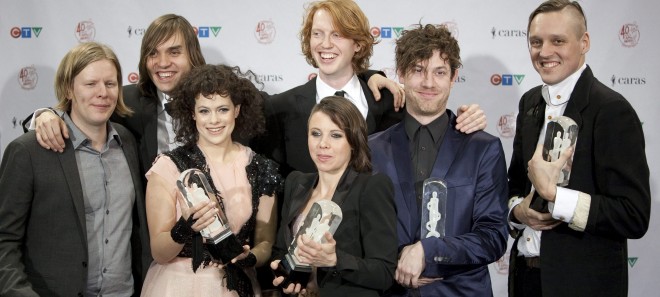Will you be watching the Juno Awards?
Last year’s Junos seemed suddenly credible to champions of both underground and established Canadian music
Arcade Fire at the 2011 Juno Awards. (Darren Calabrese/CP)
Share

I can’t tell you exactly what I was doing on the night of March 27, 2011, but I can tell you what I wasn’t doing: watching the 40th annual Juno Awards. To Canadians who care passionately about music, and especially among critics (myself included), the Junos have been something of a joke. They traditionally ignore an exciting, stimulating underground Canadian music scene in favour of showering praise on has-been pseudo-celebrities and major-label acts whose careers are propped up solely and precariously by the magnanimous “CanCon” requirements of the CRTC.
I was surprised to hear some curious things the morning after the ceremony. The first was that in 2011, 40 years after the inaugural Juno Awards in 1971, more viewers tuned in to the show than ever before. And second, there were none of the usual musical simulacra—artists and bands with no discernible fan bases, and popularity that hinged on bought “buzz”—receiving the statuettes. Almost overnight, the Junos seemed suddenly credible to champions of both underground and established Canadian music. How had the Junos become watchable again, I wondered, when record sales have been steadily declining since 1999 to make less than half of what the music industry once earned?
Canada is in the midst of a musical renaissance, and last year the Junos seemed to acknowledge it. Drake, the Toronto rap wunderkind whose unpredictable rise to international celebrity was as baffling as it was gratifying, hosted the event; some of our best unsung talent, including Chromeo, Chilly Gonzales, Tokyo Police Club, and The Sadies were given performance slots; and the excellent and domestically unheralded Arcade Fire’s 2010 opus, The Suburbs, was named Album of the Year, albeit a month after it was recognized as such by the Grammys.
For the first time, the awards were bestowed upon artists whose hard work sorely deserved acknowledgement in Canada. Arcade Fire are legitimate global superstars who made it via hard work, dedication to their craft, and seized opportunities, while less mainstream acts like Shad, Caribou, and Karkwa — winners of the Rap, Electronic, and Francophone albums of the year, respectively — foretell a bright future for Canadian music.
The ailing music biz, it seemed, had leveled the playing field, so that The Canadian Academy of Recording Arts and Sciences (CARAS), who adjudicate the awards, was forced to look beyond the RyanDans, Jann Ardens, and Nickelbacks to find artists worth celebrating. The Junos, it seems, work better under pressure. Musicians who worked hard touring, and whose art earned accolades by old-fashioned word of mouth spread by passionate fans, were selling a commendable number of records, at least enough to compete with the now-meagre sales of the mainstream. All that was left for CARAS to do was acknowledge it, and thankfully, they did.
Now, the Junos are at a crossroads. The past decade of music industry decline has forced CARAS to reconsider their place in the Canadian music scene, and given their formidable showing last year, and the viewership it inspired, their newfound interest in new and niche artists is something the awards show might do well to embrace.
That’s not to say they should go “indie”; that’s the territory of the Polaris Music Prize, the annual Canadian music award awarded to the best album of the year, “without regard to musical genre, professional affiliation, or sales history,” since 2006. The prize, whether or not one agrees with the choices of the music journalists, broadcasters and bloggers that make up the deciding jury, has the independent music scene covered: bands and artists whose achievements are too modest for the Junos to acknowledge have a prize to aim for, and they earn a reasonable amount of press just for being shortlisted. But, after winning a Polaris Music Prize, to what should Canadian musicians aspire?
The answer should be the Juno Awards. Now is CARAS’ chance to capitalize on their success last year, and they seem to be doing so. The list of nominees demonstrates even more awareness of exciting artists who, in previous years, would certainly have been overlooked: Braids, Dan Mangan, Diamond Rings, Fucked Up, Timber Timbre, Destroyer, Drake, Feist, Austra, Duck Sauce, Tim Hecker, Junior Boys and Colin Stetson, to name a few. If you aren’t familiar with these performers, that’s okay — it makes perfect sense that the Junos would be the channel through which one hears of Canadian talent ready to graduate from the underground into the mainstream. Also making sense this year: the Junos rewarding the Metal/Hard Music Album of the Year, a genre long due for its own category.
It’s true that the Canadian talent crop can be thin, but right now, it’s bearing ripe fruit whose picking could yield a golden age of Canadian music. It’s already being lauded by some, and the industry needs to foster avenues for musicians to traverse before the rest of the world notices them, rather than after. The Polaris Prize represents the first step in this process, but it’s up to the Junos to turn our most talented musicians into household names — if not just in Canada, perhaps worldwide. I’ll be watching the 2012 Juno Awards on April 1, but whether or not I do so next year, or in, say, 2015, is up to CARAS.